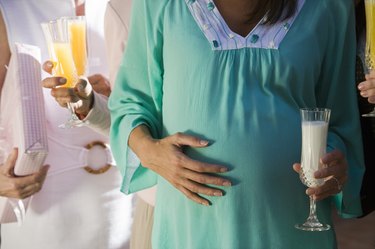
While health professionals encourage pregnant women to reduce their intake of caffeine, they do not suggest substituting caffeinated beverages with equal amounts of caffeine-free soda. A pregnant woman's healthiest beverage options include plenty of pure water and a judicious amount of milk and fruit juices. Treat all sodas and sugared drinks as treats--to be consumed only occasionally.
Caffeine
Video of the Day
Doctors recommend that pregnant women avoid caffeine whenever possible, although a moderate consumption generally is not considered unsafe. The American Pregnancy Association says, however, that doctors' definitions of "moderate" can vary anywhere from 150 to 300mg of caffeine. As a stimulant and a diuretic, caffeine raises your blood pressure and your heart rate--neither of is healthy in a pregnant woman. Diuretics also tend to increase urination, which sometimes results in mild dehydration, another condition a pregnant woman should avoid. Note, too, that caffeine does cross the placental barrier, and babies' immature systems may not be able to metabolize it.
Video of the Day
Empty Calories
According to MayoClinic.com, a normal-weight woman who becomes pregnant needs to increase her diet by only 150 to 200 calories per day during the first trimester and 300 calories per day during the second and third trimesters. A 12-oz. can of soda contains about 9 tsp. of sugar, 150 calories--and no nutritional value. To prevent unnecessary weight gain and foster healthy baby development, doctors encourage pregnant women to make every calorie a nutritious one. Mom and baby especially need foods containing extra folate to prevent birth defects, calcium and vitamin D to strengthen bones, protein to promote growth and iron to avoid anemia. Most sodas contain none of these.
Artificial Sweeteners
While it might seem logical to avoid empty calories and caffeine by turning to a diet, caffeine-free soda, this option poses concerns as well. Pregnant women with phenylketonuria must avoid aspartame altogether. In women without this disorder, however, moderate consumption of aspartame generally is considered safe. Doctors also deem sucralose as safe for pregnant women to consume, but they still question the safety of saccharin for expectant mothers. Cyclamate, a sweetener linked to some forms of cancer, is banned in the United States.
Other Chemicals
Because many consumed substances pass from a mother to her developing fetus, pregnant women must be especially cautious about consuming chemicals needlessly. The U.S. Food and Drug Administration warns that there may be low levels of benzene, a carcinogen, in some carbonated beverages. No safety standard for benzene in soda exists, but bottled and tap water may contain no more than 5 parts per billion of benzene. Between 2005 and 2007, the FDA found some carbonated beverages violating the water limit for benzene, but those products have since been reformulated or discontinued. As of May 2011, the FDA believes American sodas fall well below that 5-ppb level and therefore do not pose health risks for healthy people. Many soft drinks also contain phosphoric and citric acids, which can erode tooth enamel. While this does not pose a serious problem in occasional soda consumption, pregnant women already face increased dental risks of cavities and gingivitis, due to hormones and the trials of morning sickness.
- Medical News Today; Sip Through a Straw and Save Your Teeth; June 2005
- Clemson Cooperative Extension: Fluid Needs
- American Pregnancy Association: What's the Real Scoop on Caffeine During Pregnancy
- U.S. Food and Drug Administration: Carbonated Soft Drinks: What You Should Know
- MayoClinic.com; Pregnancy Weight Gain: What's Healthy?; May 2011
- MayoClinic.com; Pregnancy Diet: Focus on these Essential Nutrients; May 2011